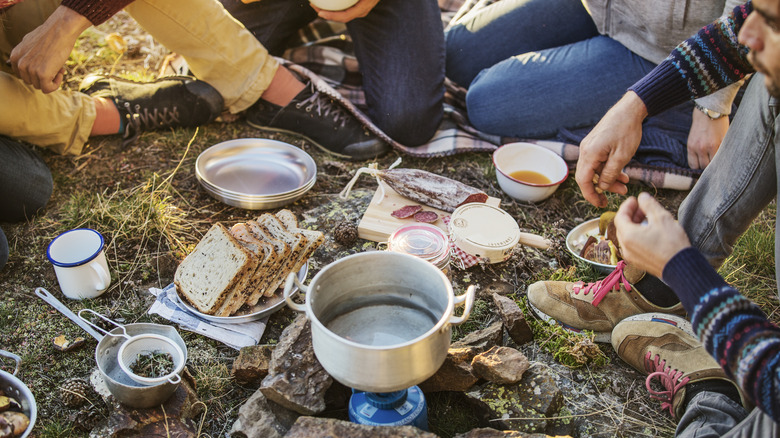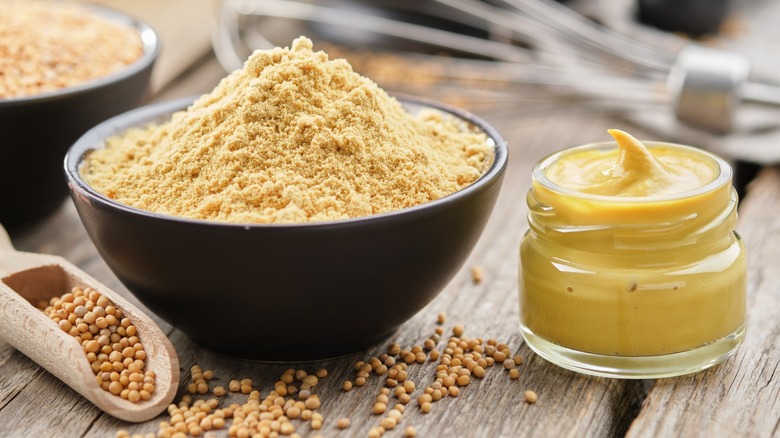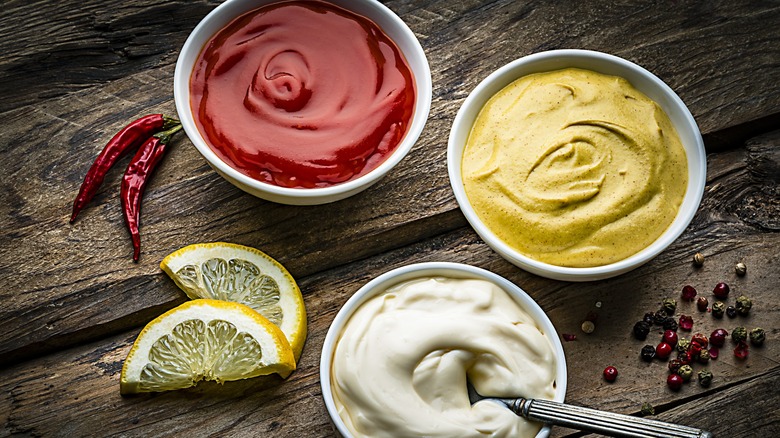Save Precious Space While Camping And Dehydrate Those Condiments
If you're serious about camping, you're going to have to make a few sacrifices for the sake of the adventure. Depending on where your outdoor trek takes you, you might have to give up hot showers, comfortable bedding, or clean clothes until your journey is over. And whatever you're eating has to be easy, portable, and mostly nonperishable (depending on the length of your stay). If you started stocking up on all your flavorful favorites, your backpack would probably begin to get unmanageable. That doesn't mean you have to do away with everything tasty for the sake of space, though. You can give your camping meals a flavor boost without having to pack one less pair of pants — just dehydrate your condiments.
Fruits, vegetables, herbs, and spices are all commonly dehydrated, but putting your condiments through the same process may sound crazy. Don't knock it until you try it, though, because it's got serious utility on the trails and will probably become one of the essential foods you can't camp without. There's no need to pack heavy plastic containers of ketchup or swipe mustard packets from your local fast food joint anymore. Just a few hours in the dehydrator or oven will give you a light, portable condiment that only needs water to bring it back to life (or that can just be eaten as it comes).
Turn your condiments into edible leathers or powders
Be forewarned: If you want to dehydrate your condiments for camping, you'll have to invest some time. This isn't a culinary choice you should make on the morning of your camping trip. To get your ketchup, mustard, and the like to the correct dehydrated texture, you'll likely need a few hours of cooking time. Luckily, it isn't as complicated as it might seem to dehydrate something so fluid — just spread a thin layer of the condiment or sauce on parchment paper on a baking sheet and let it cook on a very low temperature until it's the right texture. Although a dedicated dehydrator will take care of the mechanics — and a food dehydrator is a must-have for your kitchen – the process will work just as well in an oven.
Depending on the oil content of your condiment, it will either dehydrate into a leather (for condiments with more oil) or into a powder (for those with less oil), but either will work in the wilderness. These condiments can be eaten easily in their dehydrated form — just sprinkle your food with the powder or tear the leather into smaller pieces and mix them with your favorite dish. If you want the condiments closer to their original state and are willing to use some of your water stores, though, you can add the dehydrated ingredient and water to a pot over your campfire and bring it to a boil to rehydrate it.
Not all condiments can be dehydrated
There are some condiments that hold up well during the dehydration process. Ketchup becomes a leather (ketchup leather has even become a restaurant trend to keep your burgers from getting soggy), and mustards will turn into powder. Hot sauces, barbecue sauce, and salsa will all be easy, flavorful additions to your camping trip's culinary plan. However, there are some condiments that are better left in their liquid state. Condiments or sauces with lots of oils, fats, eggs, or dairy (think: mayonnaise, hollandaise, gravy) will spoil quickly and carry a high chance of food poisoning.
If you're using something store-bought, make sure to read the ingredients before you dehydrate it so that you can stay safe on the trail. Dehydrated hot sauces and mustards, meanwhile, can be stored long-term, and the other dehydrated condiments will be safe and useful for a short-term camping trip. It won't be long before the technique becomes essential to your adventuring — you'll start transforming canned fruit into fruit leather, turning soups into powder, and dehydrating canned veggies for a hiking snack. With just a little bit of time, you'll save a whole lot of backpack space, and you won't have to miss out on all the flavors of home while you're out in the wilderness.


